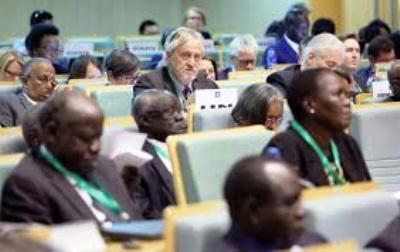High level talks not enough for achieving peace in S. Sudan: report
July 8, 2018 (JUBA) – Securing long-term peace in war-torn South Sudan requires much more than deals between the country’s political leaders, says a new study carried out on the young nation.

The report, entitled “It for the Long Haul? Lessons on peacebuilding in South Sudan, says peace is made and broken every day in South Sudan by chiefs, youth, women and commanders, under trees, in offices, in person or by mobile phone and that it is occasionally still facilitated by letter, carried across a boundary by willing hands.
The new report argues that work towards such national-level political agreements must be complemented by local and regional peace building initiatives and owned by the people of South Sudan.
“It’s understandable that diplomats, donor governments, and the international community focus their efforts and hopes on securing a deal between powerful men around the negotiating table. But history shows that focusing on high-level processes has failed to bring peace for people in South Sudan,” said Natalia Chan, Christian Aid’s Senior Adviser on South Sudan.
“What we’re suggesting is needed is a more sophisticated recognition of the conditions for peace. These include the critical roles played by leaders and peace activists at regional and local levels. The local really matters. So do the many cultural and religious practices that can help defuse potential explosions and heal relationships after decades of trauma and deep grievance,” she adds.
The new Christian Aid’s report is based on interviews with 50 long-term peace builders with experience from across the country, and with members of communities affected by violence and also draws on a review of literature about violence and peace in the nation.
The interviews were reportedly used to generate 10 principles on which there was a broad consensus, including that elites alone cannot deliver peace and people should not wait for them to do so; that there is little binding diverse communities together as a nation and that peace builders cannot ignore what happens locally.
“Yet, the countless peacemakers at the local level are obscured by the tendency of international and higher-level actors to put themselves towards the centre of analysis,” said Chan, further adding, “As a result, chances are missed to resolve some of the problems caused by competition for power at national level.
The South Sudan conflict, now in its fifth year, has killed tens of thousands of people and displaced more than three million people.
Last week, a governance meeting held in Uganda between South Sudan’s rival leaders resolved that the armed opposition leader, Riek Machar be reinstated to the post of the country’s first vice-president.
This came after signing of a security arrangement deal in Khartoum.
President Salva Kiir had initially rejected Machar’s participation in the peace process, but the region and the international community said the latter’s exclusion meant the continuation of the country’s war.
Meanwhile Christian Aid, in its new report, called on the donors to do more to support sub-national peace building in the war-torn nation.
“This should focus on promoting sustained local capacity to manage conflict and security and open opportunities for social interaction, transitional justice and economic development, whether a functioning high-level peace process exists or not,” it argued.
Such sub-national and local peace building initiatives, it further noted, can help mitigate the divisive effects of competition between elites; improve people’s lives in the short term and build relationships which reduce opportunities for violence in the future; forge positive accountability between communities and leaders and help connect disparate communities with one another, among others.
(ST)
